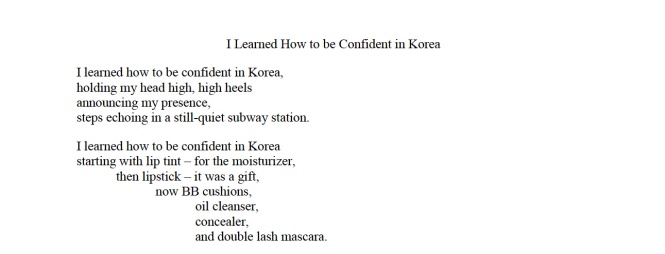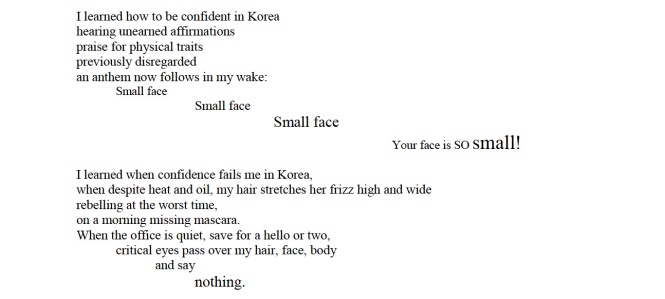This is the last post in my beauty standards series, and it was the toughest one for me to write. My relationship with beauty standards in Korea is complicated, and now I’m finally getting into the thick of it.
I was tempted to throw a poem at you and run for it. But then what would be the point of this post? The poem I’m talking about is already published. You can find it here, or read it in its original formatting below.
I promise I’ll still be here after you read it.




Ah, poetry. An abstract way to express my thoughts and feelings without fully explaining them. Because it’s up to you to interpret them. Then you can come away feeling wise and cultured.
Are you ready?
Interpret!
…
……
…
Done?
Or were you just waiting for me to just explain it already?
Fine.
I assume that you’ve gathered (from the title) that this post is about adaptation. That seems like a nice topic for a resolution. But actually, I’m going to talk about the complications that arose when I tried to adapt to Korean beauty standards.
First and foremost, I was successful.
I mastered it.
I mean, sure I could have lost some weight, gotten rid of my glasses, and fixed my teeth. If I’d stayed in Korea long enough, who knows, I might have done those things. After all, LASIK is really cheap there.
But no, my beauty was passable without these things. I’ll lay them out for you, so you can even follow this model for yourself.
Things that Made Monica Beautiful Enough For Korea
- A small face or that coveted “V-line” jaw shape
- A “high nose” or high nose bridge (aka not an Asian nose)
- Relatively light skin
- Relatively thin
- Korean skin care products
- Korean makeup, especially a BB cushion that’s too light for your skin tone
- Whatever fashion trends are popular at the time (just step outside, and you’ll figure this out soon enough. Or step into any clothing store.)
Bam! Seven easy steps!
Actually, I was surprised that people complimented my appearance so much. Because in America, I’d rarely felt beautiful.
There’s another list that’s more personal, because it’s less of a joke. It would be titled something like: The List of Things that Prevented Monica from Feeling Beautiful in America.
Even though this list causes me some discomfort, I’ll share it with you anyway. Because parts of this series, like posting weird selfies of myself, has already made uncomfortable. And because discomfort isn’t always a bad thing.
Things that Made Monica Feel UnBeautiful in America
- Being short
- Wearing glasses
- Failing to have Victoria’s Secret model curves
- Crooked teeth
- Not good at makeup
- Not good at taming hair
- Not stylish
This list seems a little silly. Why would these things make me feel like I couldn’t be attractive? That answer is long, complicated, and has a lot to do with the media and advertising industry in the US.
What I want to point out is that many of the things that made me feel unattractive in America didn’t seem to matter so much in Korea. And that was what affected my self-image the most.
Korea Negates My American Flaws
Height
Being short wasn’t a big deal in Korea. A lot of people were short. Instead, I felt about average height.
In contrast, some of my taller/average-American-height friends often felt they were too tall for South Korea. (The placement of this link makes it look like I’m friends with EatYourKimchi, which, well, could be possibly true since we met once.)
Visual Impairment
Wearing glasses didn’t matter much either. A lot of people also wore glasses. And even though I was constantly told that I should get LASIK, simply seeing so many people with glasses around me kind of negated the impact of those comments.
Body-ody-ody
The next item is curves. Well, Korea has different expectations for curves. The ideal Korean girl doesn’t need to have a big chest and butt to be sexy. Actually, women are usually infantilized, which is another serious problem. Showing too much chest is seen as promiscuous (while any amount of leg is fair game).
So I didn’t feel unattractive for being relatively flat.
Sure, Koreans still talk about attractive women having an “S-line” body, but let’s face it, their definition of an S is a lot straighter than the typical American.
A Kpop video about big booties made me laugh; I could have starred in that video myself.
All the Trappings
Makeup, hair, and fashion in Korea were easy. Just follow what everyone else is doing. There are only a few mainstream fashion trends going on in Korea at any given time. As long as you spend any time outside your home, you’ll figure them out pretty quickly.
Once a trend is popular, it’ll be everywhere. The stores all seem to sell the same styles, whether they’re cheap, discount stores or high-end department store brands. So not only is keeping up fashion trends easy, it’s fairly affordable.
As much as we value individuality here in America, it was fun to be “in the know” for a time. And watching the trends was entertaining. At one time, banana-printed clothing was really popular.
And so, I began to feel like maybe I really was attractive, at least in Korea.
Being Attractive
This is the part where I feel awkward, because I’m calling myself attractive, and that seems arrogant and unpalatable, but hey, I gotta tell it like it is.
The thing about knowing people think you’re attractive is that it feels pretty good. You stand straighter. Lift your head higher. Walk with more – dare I say it – confidence. Which finally brings us back to that poem:
“I Learned How to Be Confident in Korea”
Obviously, I’m not really suggesting that attractiveness and beauty equal confidence, but I was forced to confront the ugly and unstable relationship between the two.
That’s what I’m trying to say in the poem. (I sure made you wait for the answer.)
I was doing this cultural adaptation thing so well, and it felt great. I was not only attuned to Korean culture and getting along with natives, but I was letting Korea shape too much. Shaping my physical appearance was okay; it helped me blend in and feel less like a foreigner.
What I underestimated was how my physical changes (and consistent praise for my physical features) would affect me mentally.
So What’s the Big Deal?
Did I turn into some monster diva?
Did I obsess over appearance at the expense of the more important things in life?
Not at all. The changes really felt positive. I distinctly remember striding through a subway station on my way to school one day in high heeled boots. And those boots were loud. They echoed so much that anyone could hear me coming a mile away.
Normally I’d try to walk more quietly. I’m not a fan of noisy shoes. I don’t like causing a disruption, apparently even if that disruption is disrupting no one.
But by that morning, I’d internalized all the compliments on my appearance. I was attractive. I was powerful. I felt, maybe for the first time, truly FIERCE.
I stomped through that subway station, announcing my presence with pride.
But if someone had laughed or pointed out a flaw, would I have quieted my steps? Would I have hunched over and hurried to work, ashamed?
I was confident that day because of my accumulated compliments, but I’d also done an internal check from head to toe.
- Hair smooth and not frizzy today? Check.
- Stylish coat? Check.
- Stylish bag? Check.
- Boots matching my outfit? Check.
- Makeup done well? Check.
That confidence was contingent on all the boxes being checked. And even though I loved this new “confidence,” I had to confront the reality that it wasn’t confidence at all.
Read parts 1 and 2 here:

[…] Beauty Standards in Korea 3: Adaptation is Not All It Seems […]